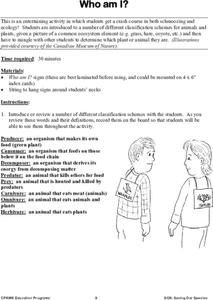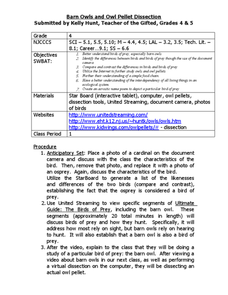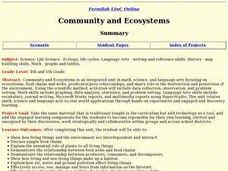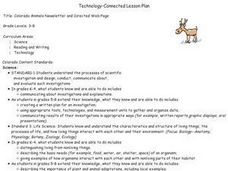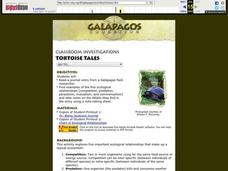Curated OER
Who Am I?
Students classify organisms into one of five categories: producer, consumer, decomposer, predator, or prey. Students play a "Who Am I" game. Signs are hung on the backs of fellow students They must ask questions to determine what...
Curated OER
Barn Owls and Owl Pellet Dissection
Students explore birds of prey and food chains. For this ecosystems and birds of prey cross curriculum science and literacy lesson, students brainstorm characteristics of birds after viewing photographs. Students view a video and...
Curated OER
Introduction to Ocean Grazers
Students explore biology by creating a poster with classmates. In this oceanography lesson, students identify the importance of coral reefs to the ocean's ecology and examine a food web of ocean animals. Students define a list of...
Curated OER
Species Diversity in Ecosystems with Different Techniques of Land Management
Students visit numerous places to help in their understanding of Ecology. In this biology lesson plan, students will learn about characteristics and how to identify numerous plants and animals. This lesson plan allows for many field trip...
Curated OER
Where's Dinner?
Upcoming marine biologists consider a list of organisms residing near the Lost City hydrothermal vents and construct a food web. They compare the food web to that of a cold seep community, of which they should have previous knowledge....
Curated OER
Ecology
Fourth graders research an ecosystem and its endangered species. They create a PowerPoint Presentation, oral report, poster or a booklet based on their research. They research on the internet and in biology texts in teams of 4.
Curated OER
Seas Of Life
Young scholars brainstorm examples of predator and prey that are featured in a video they watch. For this investigative lesson students will research an animal from the video and explain if it is a predator or prey and how it helps...
Curated OER
Community and Ecosystems
Students complete a unit of lessons on ecosystems. They participate in online activities, create a diorama, write journal entries, and develop a Hyperstudio multimedia project on a selected ecosystem.
Curated OER
Ecological Impact of River Dams
Young scholars investigate their environment by completing an in-class experiment. In this ecological lesson plan, students define the roles of dams and how electricity is created by them. Young scholars utilize plastic jugs,...
Curated OER
Wilderness Survival: A Field Practicum
Students use hands-on field-testing of authentic application from principles pertaining to: Psychology- A. Develop a positive, can-do attitude with a high degree of self-reliance that is transferable to human interactions outside of the...
Curated OER
Something Fishy - Bioaccumulation of Mercury
Students explore the dangers of eating high levels of mercury and how small amounts of mercury in water accumulate in greater quantities in organisms higher in the food chain. They list the health of effects of high levels of mercury on...
Curated OER
Nitrogen Cycle
Students identify the main concepts and ideas of the nitrogen cycle.
They review key concepts covered up to this point in ecology including food chains, food webs, energy pyramids, and bio-geochemical cycles.
Curated OER
Colorado Animals Newsletter and Directed Web Page
Students select a Colorado animal, develop a Directed Web page, and research their animal. Each member of the group combine their research and develop a Newsletter.
Curated OER
Predator and Prey Game
Young scholars explore the why the balance among producers, predators and prey is necessary in order for an ecosystem to be sustained over time. Through web games and activities, they discover how each component of the food chain works...
Curated OER
Ecosystem Interdependence
Students outline a scenario demonstrating ecosystem interdependence. They explain the effects of this change according to the food web. They give a positive example such as increased rain and have the students call out answers to your...
Curated OER
Food Chains and Webs
In this food chains worksheet, students identify the producers and consumers in the given food chains and describe how contaminants can biologically accumulate. This worksheet has 4 short answer questions.
Curated OER
Macroinvertebrate Sampling
Students identify macroinvertebrate species to investigate ecological systems and the relationship between humans and the environment.
Curated OER
Gone Fishin'
Students explore fishing and the food web. They simulate the role of fisherman using candy as fish and use provided materials to create a fishing device. Afterward, they complete data tables to organize the day's catch and report the...
Curated OER
Wild Arctic
Students explore key terms, including food web and food chain. They discuss Arctic plants and animals, devise at least three Arctic food chains and create a food web showing connections among Arctic life.
Curated OER
Who Eats Whom in the Salt Marsh?
Seventh graders complete a virtual online salt marsh tour. In groups, they observe and identify the various types of animals found in the marsh. After categorizing the animals, they create a food web based on the animals role in the...
Curated OER
Biology: living Things and their Environment
Middle schoolers recognize that organisms depend on other organisms. In this organism instructional activity, students understand symbiotic relationships and competition. Middle schoolers explain food chains and food...
Curated OER
Tortoise Tales
Students read journal entry from a Gal??pagos field researcher, find examples of five ecological relationships (competition, predation, parasitism, mutualism, and commensalism) and take notes on the details they find in the entry using a...
National Park Service
Living & Non-Living Interactions
What better way to learn about ecosystems than by getting outside and observing them first hand? Accompanying a field trip to a local park or outdoor space, this series of collaborative activities engages children in...
Curated OER
Coral Reefs Endangered
Learners research where in the world coral reefs are located. For this ecology lesson, students create food chains and food web. They simulate growing coral reefs to understand their characteristics better.
Other popular searches
- Ecology Food Webs Chains
- Ecology Food Webs Reading
- Marine Ecology Food Webs
- Ecology Food Webs Exercise
- Ecology Food Webs Ocean
- Ecology Food Webs Exrcise
